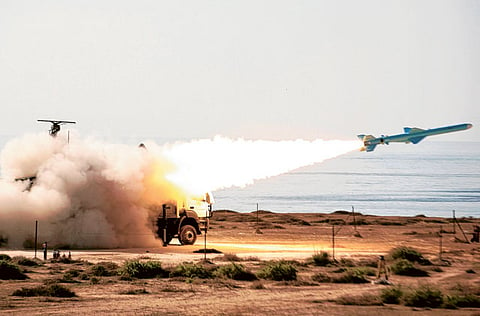Will Iran provide pretext for war?
Obama may need a war to be re-elected but that does not necessarily mean that he'll launch one

The EU decision to ban Iranian oil comes as tensions increase in the Arabian Gulf. Iranian threats to close the Strait of Hormuz if more sanctions on the Islamic Republic are agreed is now to be tested. That step could be the spark for a new Gulf War. The verbal spat between Tehran and Washington about the Strait was a muscle-flexing exercise that shouldn't be taken lightly.
During their latest naval manoeuvres in the region, Iran threatened to close the Strait if attacked or if it suffered crippling sanctions. The Americans answered by warning Tehran not to tamper with the maritime safety in Hormuz. The US Fifth Fleet, headquartered in Bahrain, kept Iranian manoeuvres in check, with the American official position that the Iranian naval war games were a sign of distress rather than a real threat.
December 2011 witnessed a stepped up campaign against Iran with a new report from the IAEA raising suspicions about Iranian efforts to develop nuclear weapons. Then Washington tightened its sanctions against Tehran to include financial sanctions — just short of crippling the Iranian central bank. Europe followed suit by tightening sanctions and imposing oil embargo on Tehran. Iranians know well that an oil embargo on them might not cause a disaster in the oil market, as Opec producers have spare capacity more than what Iran produces. So, the only impact will be depriving the world of about 40 per cent of imports passing through Hormuz. Already financial sanctions are making it impossible for Iran central bank to settle payments from its oil importers, stopping Iran exports and depriving it of revenues.
Not only sanctions might push the situation to the brink of armed conflict. There are strategic factors that explain inevitability of action against Iran. As American troops left Iraq with Syria on the brink of civil war, Iran wouldn't be left as a strong regional power. Especially as it stands in the middle of the belt including China and extended through Afghanistan to Pakistan.
Western troops will not leave Afghanistan leaving a strong Iran meddling both in it and to the west in Iraq. That might explain the Israeli pounding of war drums for the past few months. Though some bought the argument that America is not willing to allow Israel to strike Iran and open an undesired war front for Washington in the region, it might not be the case even though the American strategy is to disengage from the region. Disengagement requires guarantees for vested interests, and these guarantees can't be given without certain containment of regional powers — mainly Turkey and Iran. Turkey is almost guaranteed, for the West as part of Nato and for Washington as partner with Israel.
Sarkozy test
Moreover, the President Barack Obama faces a tough re-election contest in 2012. Hawkish Republican contenders like Newt Gingrich and Mitt Romney pose a real threat that might cost Obama a second term in the White House. As the economy is weak, and is expected to deteriorate in the coming 12 months, Obama needs another arena in which to win votes. The simple answer is war: George W. Bush won his second term in 2004 after invading Iraq. A war on Iran could even be less risky — the pretext could be a suspicious Iranian nuclear programme and threats to regional security posed by alleged Iranian ambitions in the Gulf. This would be enough to validate a war.
It has to be an American war, even if the Israelis initiats it by airstrikes on Iranian nuclear facilities. Though America participated in Nato military campaign against Libya, Obama can't claim it was an American war he won — French President Nicolas Sarkozy is more likely to do so. Sarkozy is also facing a re-election test this year, and the Libyan victory is not enough to prop him up unless he gets huge economic benefits from Libya's new rulers. So, France might be keen on war as well. Contrary to its position on Iraq in 2003, France agrees with the US on Iran, taking into account its interests with Arab Gulf countries.
The argument that Obama needs a war to be re-elected for a second term does not mean that he'll necessarily launch it, but if he opts for it, it will be for the aforementioned reasons. Whether the Iranians are pushing for that war or trying to avoid it by showing deterrence capability is another issue: some argue that the theocratic regime in Tehran is becoming more unpopular and might need a war to garner public support. That might be a bit far-fetched, but the course of latest events seems to be pushing the region into another fire.
Whether Iran and Arab Gulf countries can stand another armed conflict in the region is not certain, and the ball is now in Tehran's court: either escalate stubbornly or compromise avoiding war and sparing the whole region a disaster — even if it means depriving Obama an election-winning war.
Dr Ayman Mustafa is a London-based Arab writer.



